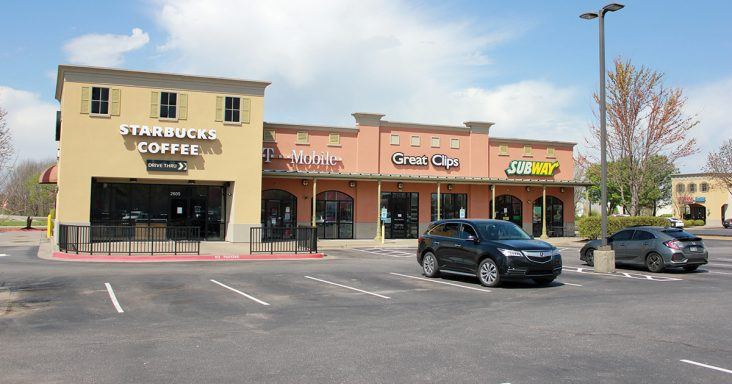April a telling month for commercial landlords, tenants
by April 15, 2020 1:26 pm 3,581 views

The parking lot of a retail strip center in Rogers' Tuscany Square development sat largely empty during a recent weekday lunch hour.
In March, the COVID-19 pandemic forced large chunks of the U.S. economy to a halt.
The retail and personal services industry bore the brunt, initially as a result of social distancing and reduced foot traffic, then ultimately by mandated store closings, reducing operating hours and the size of public gatherings.
When the calendar turned to April, however, there remained one constant of doing business for most retail tenants: Rent was due whether circumstances halted income or not. And it’s billions of dollars at play. CoStar Group, which tracks commercial real estate information, estimates U.S. landlords collect between $15 billion and $20 billion from commercial tenants in a typical month.
“Across the board, tenants are reaching out to us,” said Steve Lane, the managing director of the Rogers office of Colliers International Arkansas. Combined with an office in Little Rock, it’s the state’s largest commercial real estate and property management firm, with roughly 18 million square feet of commercial space leased and managed on behalf of property owners.

Lane said each leasing agreement situation is unique, and different landlords will have different responses to cash-strapped tenants. Lawyers will be busy, he said, examining “force majeure” provisions. Force majeure (“superior force”) or “act of God” clauses justify tenants’ suspension of performance of their duties under their leases. That means primarily operating and paying rent.
“Landlords need to be consulting their attorneys, and tenants need to be consulting their attorneys,” Lane said.
Megan Murdock is the executive portfolio manager in Colliers International’s Northwest Arkansas office and oversees the operation and development of the firm’s NWA property management portfolio and staff. She said the company worked quickly to put together standardized responses to tenants as their initial requests came in about the idea of temporary rent relief as a result of coronavirus-related closures.
“That way we can give them a response, and we, of course, forward that to ownership,” Murdock said. “That’s when we engage with the owners and determine how they want to respond to each tenant. Each one is going to be case-by-case with different scenarios.”
Murdock said if a business has no income, the two sides can renegotiate lease terms to defer rent for a couple of months. Those payments may be tacked onto the end of an extended lease.

“Landlords have been gracious so far,” she said. “They have been working with tenants.”
Zack Kifer, with Newmark Moses Tucker Partners in Bentonville, agreed that most landlords are willing to do what they can to help.
“In most cases, the solution depends on what relief the bank holding the landlord’s loan is willing to go along with since most of these [retail buildings] are cash flow investments for landlords,” he said.
Kifer said some banks are temporarily allowing landlords to make interest-only payments on loans. Landlords are passing that on to tenants through rent reduction. Some landlords are willing to give tenants up to three months of free rent by recapturing rent amortized over the remainder of the year or even next year, with no interest.
Some landlords, Kifer said, aren’t yet willing to renegotiate because the banks servicing their loan won’t budge. He explained that the lenders expect tenants to find the relief they need through loans and grants available through the CARES Act, the $2.2 trillion stimulus package approved by Congress in late March.
“But it’s tough to know if [tenants] will receive those payments quick enough to survive,” Kifer said. “It’s a ticking clock.”
Alan Cole says banks aren’t yet directing landlords on what they can and can’t do, but they are involved in the conversations.
“We are advising our landlords to communicate consistently with their lenders with their plans,” said Cole, a principal and executive vice president at Colliers International in Rogers. “We aren’t seeing banks say [to landlords], ‘You need to tell us exactly what you are doing with each tenant and send us an updated lease.’ It’s not to that point yet. The banks, for the most part, are working with the landlords on their loan terms and modifying those. They’re assessing the situation.
“We’re on the precipice of this. This [April] is the first month that tenants are required to pay their rent check. These things take time to work their way through. I don’t know that we will have a full grasp of what the full impact is going to be for tenants and landlords and lenders for a few months.”
LANDLORD PERSPECTIVE
Burke Larkin heads up the Rogers office of Little Rock firm Whisinvest Realty, the developer behind The District at Pinnacle Hills, a 54-acre development at the southwest corner of the intersection of southbound Interstate 49 and Pauline Whitaker Parkway in Rogers.
The District, Larkin said, has about 40,000 square feet of commercial/retail space in two buildings. They are primarily occupied by a variety of restaurants and personal services businesses that are now temporarily shuttered because of the COVID-19 pandemic. Smitty’s Garage, Mirabella’s Table, Adella Nail Bar, Copper & Oak Hair Co. and Nooma Yoga Studio, to name a few.
Larkin acknowledged the unique set of circumstances and said Whisinvest is dealing with each tenant on a case-by-case basis. He did not say which, if any, tenants paid their April rent as usual, nor which ones asked for temporary relief.
“We have talked to all of them [tenants] directly and individually, and we’ve done a little bit of everything,” he said. “But we are not forcing anybody’s hand. These people were partners before this [pandemic] happened, and we want to be partners after all this is said and done.
“We’re trying to give them relief and also working with our lenders to try and figure out what this thing looks like going forward. It will be interesting to see how the rest of the month plays out. Everything is predicated on the rent getting paid or not getting paid on the first of the month.”
Larkin said Whisinvest is still moving forward with plans to build a third office building in The District. The two existing properties total about 76,000 square feet.
“We have a little bit of vacancy there, but we’re still negotiating through leases and still working through some new letters of intent,” he said. “We may even be announcing some new tenants later [in April].”
From a national perspective, some well-capitalized landlords who are also recognizable retail companies are recognizing the unprecedented situation and giving rent breaks to their tenants. Walmart, the world’s largest brick-and-mortar retailer, and Publix, the third-largest grocery chain in the U.S., are giving breaks on rent to tenants within their store and strip-mall properties.
Combined with its warehouse division (Sam’s Club), Walmart has more than 10,000 leased spaces inside its stores throughout the country to a variety of small businesses — hair and nail salons, optometrists, restaurant franchises, veterinary clinics, and local and regional banks.
The relief applies to April payments, and the company said it would monitor the “need for additional support beyond that.”
Publix, a Florida-based chain, said it would waive rent payments for April and May.
